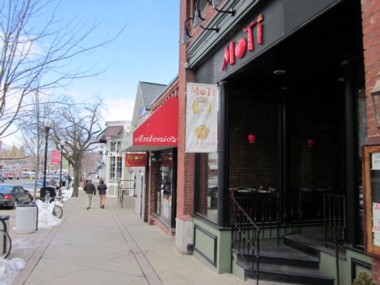Amherst restaurateurs are concerned that UMass is promoting its own Auxiliary Services, which operates UMass’ food and hotel services, and impeding the ability of the local businesses to compete on a level playing field within the regional economy. Due to its large overhead capacity and limited tax and rental obligations, the restaurateurs say, Auxiliary Services is able to engage in business practices, such as offering parents of UMass students free meals throughout the year, that independent businesses can’t afford.
“This is government becoming enterprise,” Reza Rahmani, owner of the restaurant Moti and the nightclub Lit, told the Advocate. “If Walmart were doing this, they’d be sitting in court on monopoly charges.”
Owners of several restaurants, including Moti, the Black Sheep Deli, Antonio’s, Pasta E Basta, and the Hangar Pub and Grill met with state senator Stan Rosenberg, Rep. Ellen Story and Rep. Paul Mark on March 8 at the Ginger Garden in Amherst. A smaller group met with Rosenberg and Story March 15 at the Amherst Brewing Company.
The restaurateurs brought a concise list of concerns to their meeting at the Amherst Brewing Company. A separate list, created by the Amherst Business Improvement District (BID) and Amherst Area Chamber of Commerce, whose executive director, Tony Maroulis, was in attendance at both meetings, was discussed as well. Rosenberg and Story are setting up a meeting between a few of the restaurateurs and UMass Chancellor Kubble Subbaswamy.
The requests of the restaurateurs include greater clarity regarding the university’s delivery and catering policies; allowing downtown businesses to provide catering at off-campus university events, such as parties at the houses of professors and end-of-year banquets for sports teams; and the implementation by UMass of a “one-card system,” whereby students can use a meal card to eat at off-campus as well as on-campus locations.
This type of meal system, Nick Seamon, owner of the Black Sheep Deli told the Advocate, is popular at “many, many, many” other state universities, such as the University of Michigan in Ann Arbor and the University of Arizona in Tucson.
The previously popular Off Campus Meal Plan (OCMP) program, started up by a UMass graduate as a private business not affiliated with UMass, allows students to use a meal card either on campus or off. It was widely used by students before the university began offering its own competing Your Campus Meal Plan (YCMP), contend the restaurateurs. The Black Sheep used to get $1,500 a month in revenue from the OCMP plan. Now, says Seamon, the deli gets $200 a month.
Particularly troubling for the group is the loss of several catering gigs that had long been a steady source of revenue. Seamon says the Black Sheep Deli has lost catering business to Auxiliary Services. Likewise, the UMass men’s hockey team recently told the Amherst Brewing Company that they had to use Auxiliary Services for their end-of-season banquet despite a previous agreement with the brewpub, owner John Korpita said.
“There’s also a huge concern about the tax exempt status” of Auxiliary Services in relation to the UBIT (Unrelated Business Income Tax) section of the tax code, continues Seamon.
But university officials say they are supportive of the local businesses, and continue to work closely with them.
“The total amount of money we’ve spent on food in the community has risen in the past three years,” Edward Blaguszewski, executive director of the university’s Office of News and Media Relations, told the Advocate. “It’s in our books.”
Prospective new faculty and staff, for example, are often taken out to local restaurants as part of the recruitment process. In 2012, UMass paid $706,000 to local restaurants and caterers and spent nearly a quarter of a million dollars at area grocery stores.
Furthermore, Blaguszewski says, UMass’ state funds are “entrusted to the university” to determine how they should be spent, and are not “public money to be bid on.”
As for restaurant owners’ concerns about Auxiliary Services, Blaguszewski notes that the nonprofit is “self-sustaining,” and that all money made from its food service and hotel operations is put back into the university. In other words, Auxiliary Services is a revenue source for the university in a time of lean budgets.
Worry about lost business with the university began to intensify a year and a half ago, when “an unknown professor dropped off a copy of a memo at Black Sheep Deli,” the Daily Collegian reported. The memo, written by former Vice Chancellor of Administration and Finance Joyce Hatch in 2007, was sent to department heads, directors, and deans, and states that “private vendors operating food carts, concessions, catering and other food service operations are prohibited from operating on campus.”
The downtown restaurants began meeting about two years ago, Seamon told the Advocate. They addressed their concerns to Story in the fall of 2011, and to Rosenberg in the spring of 2012. “It took a while to see that others were experiencing the same thing,” Seamon says of the restaurateurs’ shared business struggles. “Everybody has a story.”
Seamon acknowledged that, while the restaurant owners are grateful for the help of the representatives, many in the group have grown skeptical of the process. Rahmani said he worries that these discussions will be reduced to “politics as usual.”
“The fact that so many owners were at that first meeting should speak volumes,” Rahmani told the Advocate. “The status quo is no longer working.”
A UMass alum who graduated in 2004, Rahmani opened Moti in 2009. “I did it in good faith,” he says, referring to an expected give-and-take relationship between the university and downtown businesses.
“But at the rate we’re going, you’ll see places boarded up in a year or two,” he says, noting that, if presented with the opportunity to do it again, he would not open Moti this time around: “Not in a million years.”•



